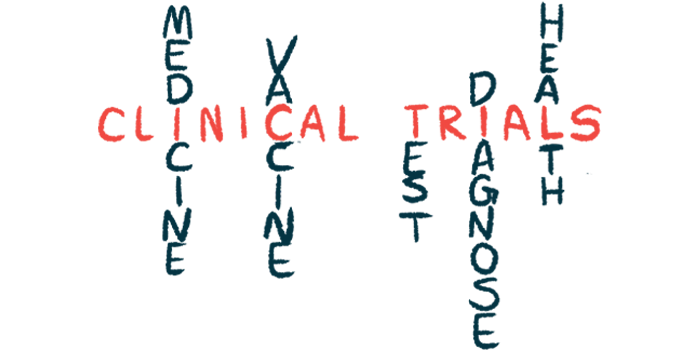Efzofitimod misses main goal in large pulmonary sarcoidosis trial
But developer says clinical benefits were seen for patients in top-line data
Written by |

EFZO-FIT, a Phase 3 clinical study testing efzofitimod for pulmonary sarcoidosis, failed to meet its main goal of significantly reducing the need for corticosteroids among people with the rare inflammatory disease.
However, the first-in-class immunomodulatory therapy did show some clinical benefits, according to its developer Atyr Pharma. Specifically, nearly twice as many patients on either of the two doses of efzofitimod tested were able to stop corticosteroids completely — and reported better quality of life compared with those on a placebo, data showed.
Efzofitimod also helped preserve lung function and was well tolerated, Atyr said in a company press release announcing the early study findings.
The company now plans to discuss these top-line data with the U.S. Food and Drug Administration (FDA) to decide what steps to take next in developing efzofitimod for pulmonary sarcoidosis, an inflammatory disease in which small clusters of immune cells, called granulomas, form in the lungs and make breathing difficult.
“We look forward to discussing the totality of the data with the FDA in order to determine the path forward for efzofitimod in pulmonary sarcoidosis, as there remains an urgent need for a safe and effective treatment option to address the unmet needs of this underserved population,” said Sanjay S. Shukla, MD, Atyr’s president and CEO.
Oral corticosteroids are the first-line treatment for sarcoidosis, but high doses or long-term use of these medications can cause serious side effects. Other treatments may reduce the need for oral corticosteroids, but they also weaken the immune system and increase a person’s risk of infections.
EFZO-FIT testing efzofitimod in more than 250 pulmonary sarcoidosis patients
Efzofitimod targets activated myeloid cells — immune cells involved in the inflammatory response — by binding to a protein called neuropilin-2 (NRP2) that’s found on their surface. Because NRP2 is abundant in granulomas, efzofitimod is expected to reduce inflammation without weakening the immune system.
The EFZO-FIT study (NCT05415137) is testing how well and how safely efzofitimod works compared with a placebo when infused directly into the bloodstream — every four weeks at either 3 or 5 mg/kg for a total of 12 doses — in 268 adults with pulmonary sarcoidosis. The trial enrolled patients from the U.S., Europe, Japan, and Brazil.
Its main goal — to watch for changes in the need for oral corticosteroids from the study’s start to week 48 — was not met, the data showed While the mean daily dose of oral corticosteroids was lower in patients treated with 5 mg/kg of efzofitimod compared with the placebo (2.79 vs. 3.52 mg), the difference was not statistically significant.
Secondary goals included assessing changes in the King’s Sarcoidosis Questionnaire (KSQ) Lung score, a measure of how sarcoidosis affects quality of life related to lung health. On average, patients treated with the higher dose of efzofitimod had a significantly greater increase in the KSQ-Lung score compared with those on the placebo (10.4 vs. 6.2), indicating a better quality of life.
This study demonstrates that patients with chronic, symptomatic sarcoidosis can be managed with substantially lower steroid doses than previously thought. In spite of a higher than anticipated placebo response, we found that treatment with efzofitimod was associated with a greater amount of steroid reduction.
There also was a higher proportion of patients treated with efzofitimod who both stopped corticosteroids completely and reported better quality of life related to lung health compared with those on the placebo. This occurred regardless of whether these individuals received a dose of 3 mg/kg (27.9% vs. 14.4%) or 5 mg/kg (29.5% vs. 14.4%).
“This study demonstrates that patients with chronic, symptomatic sarcoidosis can be managed with substantially lower steroid doses than previously thought. In spite of a higher than anticipated placebo response, we found that treatment with efzofitimod was associated with a greater amount of steroid reduction and an improvement in the KSQ-Lung score,” Shukla said.
Forced vital capacity — a measure of the maximum amount of air that can be forcibly exhaled from the lungs after a deep breath — did not change significantly over time, suggesting that lung function was preserved or did not worsen.
Experimental therapy found to improve patient quality of life
For Daniel Culver, the study’s principal investigator and chair of the department of pulmonary medicine at Cleveland Clinic, these data provide “not only strong evidence of … efzofitimod’s effect on quality of life and its capacity to facilitate steroid withdrawal, but also increased confidence that steroids overall can be reduced to manage symptoms and lung function without the fear of worsening disease.”
According to Culver, “it is by far the largest interventional study completed in sarcoidosis to date.” The scientists said the results thus far “provide valuable insights about the treatment of pulmonary sarcoidosis, which are likely to inform treatment practices in the future.”
Patients who complete EFZO-FIT and want to continue treatment with efzofitimod may enroll in an individual expanded access program, the company has announced. In a presentation of its top-line data, Atyr said this type of program lets patients access experimental treatments outside of clinical testing when no other options are available.
Per Shukla, the company is not dissuaded by the early results.
In fact, “we are encouraged by the potential of efzofitimod to improve the lives of those living with sarcoidosis, and we are incredibly grateful to the patients, investigators, patient advocacy organizations and our partner Kyorin Pharmaceutical,” Shukla said. Kyorin holds the rights to develop and market efzofitimod in Japan.







